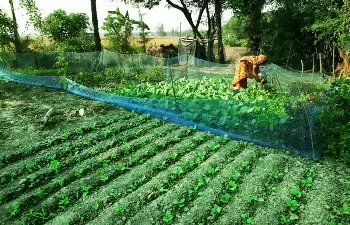A slow weaning away of human beings from nature has disrupted natural balance

01-March-2013
Vol 4 | Issue 9
Greener, bigger, fresher and more wholesome than elsewhere in the country - that's how vegetables appear here, in the manicured Saramsa Gardens, the venue of the Sikkim International Flower Show, 2013.
Rows upon rows of potted vegetables flourish in what is described as the state's organic stomach.
 |
|
Sikkim will become an organic state by 2015 (Photo by Senthil Kumaran - for representation purpose only)
|
Tomatoes, dwarf red peppers (jolokia), chinese cabbage, Indian cabbage, green lettuce, red lettuce, zucchini, broccoli, cauliflower, beetroot, turnips, 60 varieties of locally-grown rice, ginger, cardamom, grains, oranges and bananas all point to a target well within reach - this eastern Himalayan state is set to achieve "complete organic agriculture status" by 2015.
In two years, 64,876 hectares of farmland under the Sikkim Organic Mission, will be farmed without chemical pesticides or fertilizers. The target is being achieved in three phases.
Of the total area, 8,128 hectares have already been brought under organic cultivation, according to figures released by the state government. Another 18,242 hectares of farmland is under conversion to organic cultivation.
"In 2003, we were the first state to start organic farming. Chief Minister Pawan Chamling brought a resolution (to this effect) in the state assembly. Since then, farmers have begun to try their hand at organic cultivation of vegetables, spices and fruits. It began as a mission in 2010," says Tenzing Bhutia, additional executive director of the Sikkim Organic Mission.
Bhutia said Sikkim, a small hilly state where the average size of land holding worked out to 1.2 hectares, is dependent on rain-fed irrigation which is erratic; there were several reasons to go organic.
"States like Punjab, Bihar, Maharashtra, Uttar Pradesh and Andhra Pradesh have a mandate for National Food Security. While Punjab produces wheat for the country, Andhra grows rice. We have no mandate and can afford to grow high-value low-volume crops organically to make farming economically sustainable and ensure quality produce," Bhutia said.
The crops that are on the state's organic roster are of the horticultural variety. The state has a mixed-use cropping pattern and usually all the crops grown on one farm are organic.
"We do not select crops for organic cultivation. We even promote farm production of organic inputs like organic manure and bio-pesticides, and provide infrastructure credit for construction of vermi-compost and rural compost pits and farm accessories," he said.
The state government has been reducing subsidies on chemical fertilizers and pesticides by 10 percent every year to discourage their use, and has stopped lifting the quota of the government's chemically-treated fertiliser, the official said.
A "carpet" (intensive) campaign to promote awareness about organic farming is underway in the state, with workshops and creation of growers' group committees at the grassroots to network between organic farm clusters.
Three "Livelihood Schools" have trained 816 educated youths in organic farming; of these, 550 students have been employed as supervisors by farms, and they earn around Rs.6,500 per month.
"Sikkim is looking at the affluent urban middle class in the country to buy its organic produce, which costs barely Rs.10 more than inorganically grown products," the official said.
Speaking of the growing interest in organic produce, K.R. Dhaiman, vice-chancellor of the Y.S. Parmar University of Horticulture and Forestry (in Solan, Himachal Pradesh) said: "Nearly 50 percent to 60 percent of our agricultural land is rain-fed and uses non-intensive production methods.
“The application of chemical pesticides in these farms is bare minimum and the bulk of them are still non-commercial in their production goals. To make agriculture profitable here, government has to convince farmers to switch to organic farming."
Dhaiman, who is attending the Sikkim International Flower Show as a special delegate, said: "Human beings have grown up with nature. But the slow weaning away from nature with progress has disrupted natural balance."
Dhaiman stressed the need to revive organic cultivation in non-Green Revolution areas in the country, a large portion of which lies in the hills.
A policy statement for organic farming released here this week states that nearly 600,000 farmers in India produce more than 1.8 million tonnes of organic commodities, valued at nearly Rs.5,600 crore (nearly a billion dollars) annually. – IANS














